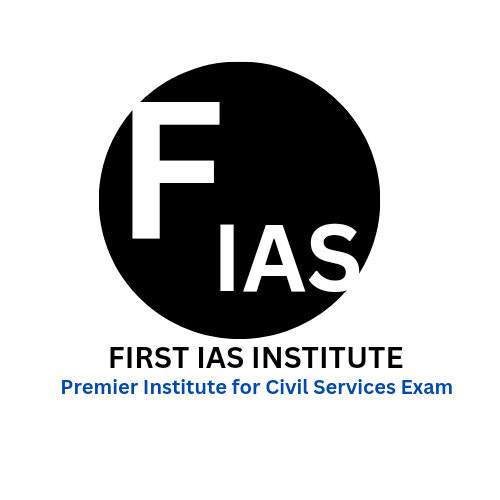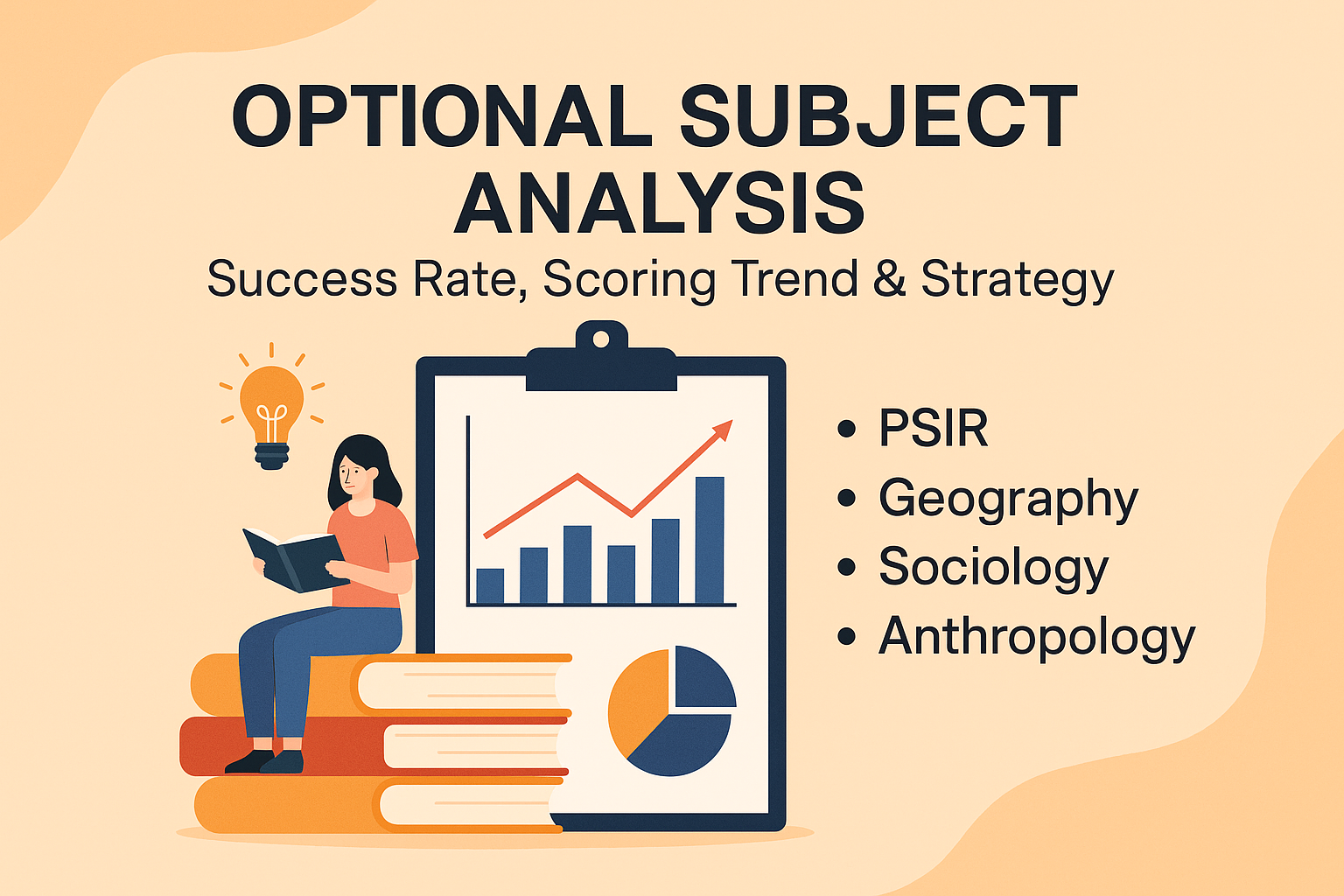Optional Subject Analysis: Success Rate, Scoring Trend & Strategy
Cracking the UPSC Civil Services Examination (CSE) requires not only hard work and perseverance but also smart choices — and one such critical choice is the selection of the optional subject. Though optional papers contribute only 500 marks in the Mains stage (out of 1750), they can make or break a candidate’s chance of securing a top rank. Hence, a thorough understanding of the success rate, scoring trend, and preparation strategy for each optional subject becomes essential.
This comprehensive guide dives into some of the most popular optional subjects — PSIR (Political Science and International Relations), Geography, Sociology, Anthropology, and others — to help you make an informed decision.
Join WhatsApp community for Free Notifications, Updates, Study Material, Mock Tests, Internship Updates, and Current Affairs - CLICK HERE TO JOIN
Understanding the Role of Optional Subjects in UPSC CSE
Why Is the Optional Subject Crucial?
- It accounts for 500 marks out of the 1750 marks in the written Mains.
- Often, top rankers score significantly higher in optional papers than in GS papers.
- A smart choice can significantly boost your final rank, even if your GS scores are average.
Factors to Consider While Choosing an Optional
- Background and academic interest
- Availability of standard resources
- Quality of mentorship (e.g., First IAS Institute for structured guidance)
- Overlap with GS papers
- Time available for preparation
Let’s now analyze the most sought-after subjects one by one.
Political Science & International Relations (PSIR)
Why PSIR Is Popular
High Overlap with GS
- PSIR has significant overlap with GS Paper II (Polity and IR).
- It also helps in Essay and Interview due to its analytical nature and relevance to current affairs.
Scoring Trend
- PSIR has shown consistently high scores in recent years.
- Many top-rankers have scored 270–320 out of 500 in this subject.
- Paper I is more theoretical, whereas Paper II requires a dynamic understanding of global and Indian political developments.
Strategy for PSIR
Paper I (Political Theory & Indian Politics)
- Focus on thinkers like Plato, Aristotle, Hobbes, Marx, etc.
- Build conceptual clarity through standard books and structured notes.
Paper II (Comparative Politics & International Relations)
- Stay updated with international events, India's foreign policy, and global institutions.
- Link static theory with contemporary developments for better answer enrichment.
Tips:
- Use diagrams and flowcharts to make answers visually appealing.
- Practice answer writing regularly.
- Refer to ARC reports and international journals to add depth to answers.
To Enroll in FIRST IAS INSTITUTE - Click Here
Sociology
Why Aspirants Choose Sociology
- It is perceived as a short, concise, and scoring optional.
- Suitable for students from non-technical backgrounds.
- Significant overlap with GS Paper I (Society) and Essay Paper.
Scoring Trend
- Consistently producing good marks, especially when presentation is good.
- Candidates have scored up to 300+ in Sociology.
- Simpler and predictable syllabus.
Strategy for Sociology
Paper I (Fundamentals of Sociology)
- Build understanding of basic sociological thinkers like Durkheim, Weber, Marx, Parsons, etc.
- Stick to limited resources and revise them multiple times.
Paper II (Indian Society)
- Integrate current social issues like caste, gender inequality, social mobility, etc., with theory.
- Use examples from government reports and current news.
Tips:
- Prepare case studies and examples.
- Write in a simple and clear language.
- Practice through previous year papers and test series.
Geography
The Classic Optional — Still a Safe Bet?
Geography continues to be a widely opted subject, especially among aspirants with a science or engineering background.
Advantages:
- Logical and scientific in nature — appeals to analytical minds.
- Overlaps with GS Paper I, GS Paper III (Environment), and Geography portions in Prelims.
Scoring Trend
- Geography’s scoring trend has been volatile in recent years.
- Requires deep conceptual understanding and effective map-based answers.
Strategy for Geography
Paper I (Physical Geography)
- Focus on core concepts — Geomorphology, Climatology, Oceanography, Biogeography.
- Practice diagrams, illustrations, and labeling maps.
Paper II (Human and Indian Geography)
- Study economic geography, regional planning, population studies, and contemporary issues.
- Use India-specific examples and integrate current data.
Tips:
- Practice drawing maps for every answer.
- Don’t get lost in data — focus on application and correlation.
- Solve previous years' questions topic-wise.
Join WhatsApp community for Free Notifications, Updates, Study Material, Mock Tests, Internship Updates, and Current Affairs - CLICK HERE TO JOIN
Anthropology
The Rising Star Among Optionals
Anthropology has become an increasingly preferred subject among medical and science background students.
Advantages:
- Compact and scoring syllabus
- Paper I is theory-heavy while Paper II is application-based and India-centric.
- Less competition, so better chances of standing out.
Scoring Trend
- Anthropology has seen scores soaring to 310+ in some years.
- Several top rankers have made it to the final list with Anthropology in recent years.
Strategy for Anthropology
Paper I (General Anthropology)
- Study evolution, human genetics, society and culture, economic and political organizations.
- Requires clarity in concepts and definitions.
Paper II (Indian Anthropology)
- Focus on tribal communities, development issues, constitutional safeguards, and ethnographic accounts.
Tips:
- Incorporate diagrams of skulls, bones, and tools where relevant.
- Stick to limited and high-quality sources.
- Take mock tests regularly to improve speed and articulation.
To Enroll in FIRST IAS INSTITUTE - Click Here
Other Optional Subjects — Brief Insights
History
- Vast syllabus but great for those with a passion for history.
- Good overlap with GS Paper I and Essay.
- Requires strong memory and storytelling ability.
Philosophy
- Crisp syllabus and theoretical nature.
- Ideal for humanities students.
- Scoring depends heavily on conceptual clarity and articulation skills.
Public Administration
- Once very popular, now slightly less due to unpredictable scoring trends.
- Overlaps with GS Paper II and governance portions.
Literature Subjects (Hindi, English, Regional)
- Ideal for candidates with a strong literary background.
- Less competition, but requires fluent writing skills and deep literary understanding.
How to Choose the Best Optional for You
Ask Yourself These Questions:
- Do I have prior academic exposure to the subject?
- Can I sustain interest in the subject for a year or more?
- Are the resources and mentorship easily accessible?
- Does it have overlap with GS or Essay papers?
- Is the syllabus manageable with the available time?
Join WhatsApp community for Free Notifications, Updates, Study Material, Mock Tests, Internship Updates, and Current Affairs - CLICK HERE TO JOIN
General Strategy to Ace Optional Papers
1. Stick to the Syllabus
- Print out the UPSC syllabus.
- Align your notes and books strictly with it.
- Avoid unnecessary digressions.
2. Master the Basics
- Focus on building a solid conceptual foundation.
- Read NCERTs or standard basic books before diving into advanced texts.
3. Make Short Notes
- Prepare crisp notes topic-wise.
- Use diagrams, flowcharts, and mnemonics for better retention.
4. Previous Year Questions Are a Goldmine
- Solve them religiously.
- Identify repeated themes and frequently asked questions.
5. Join a Test Series (e.g., First IAS Institute)
- Helps you simulate exam conditions.
- Provides structured feedback and helps you improve answer quality.
6. Revise, Revise, Revise
- Schedule multiple rounds of revision before the Mains.
- Regularly update your notes with current developments where relevant.
To Enroll in FIRST IAS INSTITUTE - Click Here
Final Thoughts
Choosing the right optional subject is more than a tick-box exercise — it’s a strategic decision that can transform your UPSC journey. While subjects like PSIR, Sociology, Geography, and Anthropology continue to dominate the popularity charts, each aspirant must choose based on personal strengths, interest, and resource availability.
Success in optional papers comes not from choosing a so-called "scoring subject" but from consistent preparation, smart answer writing, and a genuine interest in the subject. With the right approach and strategic mentorship (such as from First IAS Institute), any optional subject can become your stepping stone to success.
Good luck with your UPSC preparation!


 firstiasofficial@gmail.com
firstiasofficial@gmail.com
Leave a Comment